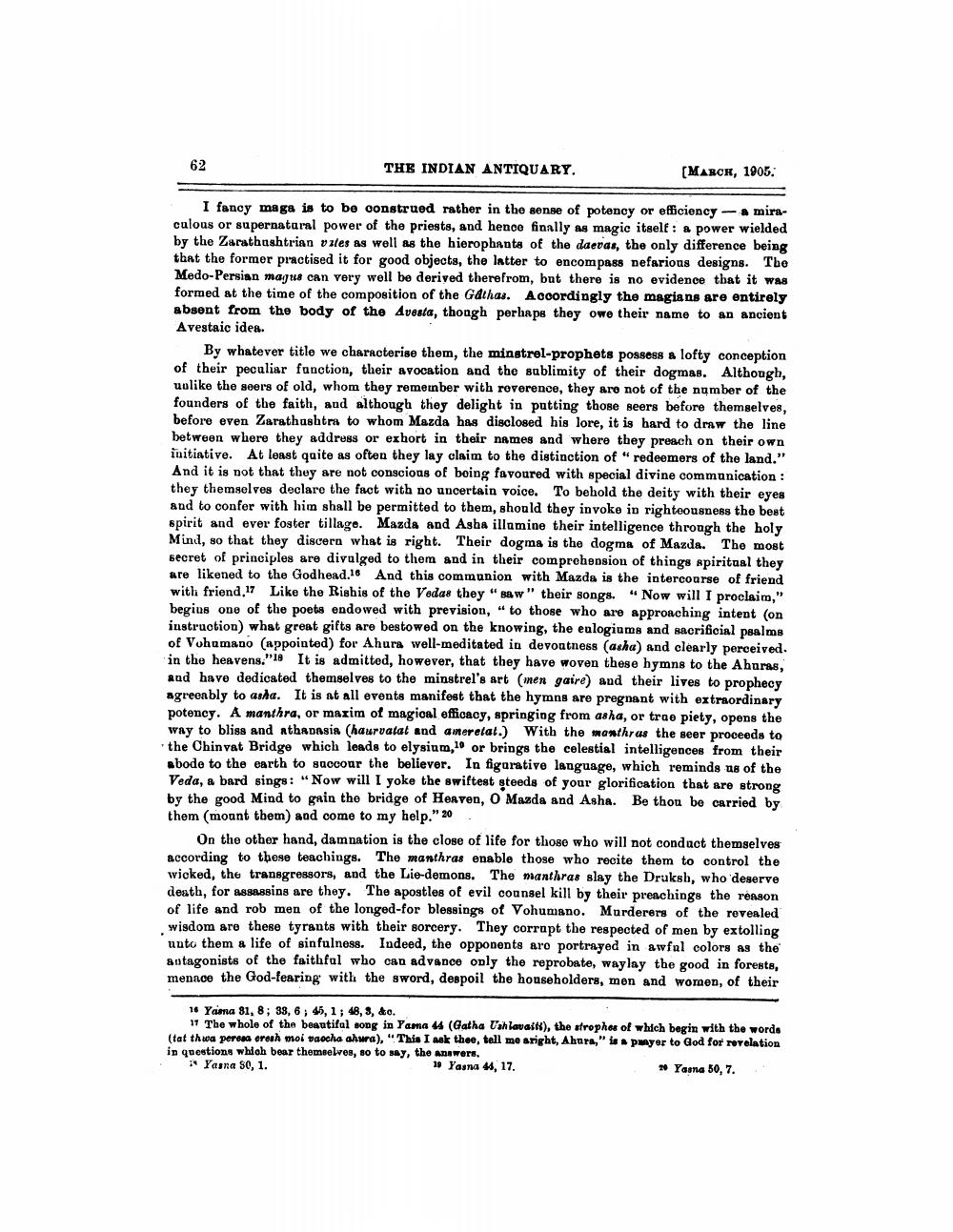________________
THE INDIAN ANTIQUARY.
(MABCR, 1905.
I fancy maga is to be construed rather in the sense of potency or efficiency - a miraculous or supernatural power of the priests, and hence finally as magic itself: a power wielded by the Zarathashtrian viles as well as the hierophants of the daevas, the only difference being that the former practised it for good objects, the latter to encompass nefarious designs. The Medo-Persian maju can very well be derived therefrom, but there is no evidence that it was formed at the time of the composition of the Gathas. A coordingly the magians are entirely absent from the body of the Avesta, though perhaps they owe their name to an ancient Avestaic idea.
By whatever title we characterise them, the minstrel-prophets possess a lofty conception of their peculiar function, their avocation and the sublimity of their dogmas. Although, uolike the seers of old, whom they remember with reverence, they are not of the number of the founders of the faith, and although they delight in putting those seers before themselves, before even Zarathashtra to whom Mazda has disclosed his lore, it is hard to draw the line between where they address or exhort in their names and where they preach on their own initiative. At least quite as often they lay claim to the distinction of "redeemers of the land." And it is not that they are not conscious of being favoured with special divine communication : they themselves declare the fact with no uncertain voice. To behold the deity with their eyes and to confer with him shall be permitted to them, should they invoke in righteousness the best spirit and ever foster tillage. Mazda and Asha illamine their intelligence through the holy Mind, so that they discern what is right. Their dogma is the dogma of Mazda. The most secret of principles are divalged to them and in their comprehension of things spiritual they are likened to the Godhead.16 And this communion with Mazda is the intercourse of friend with friend. 17 Like the Rishis of the Vedas they “saw" their songs. Now will I proclaim," begins one of the poets endowed with prevision, " to those who are approaching intent on instruction) what great gifts are bestowed on the knowing, the ealogiams and sacrificial psalms of Vohumano (appointed) for Ahura well-meditated in devoatness (asha) and clearly perceived. in the heavens."19 It is admitted, however, that they have woven these hymns to the Ahuras, and have dedicated themselves to the minstrel's art (men gaire) and their lives to prophecy agreoably to asha. It is at all events manifest that the hymns are pregnant with extraordinary potency. A manthra, or maxim of magical efficacy, springing from asha, or trae piety, opens the way to bliss and athanasin (haurvatal and amerelat.) With the manthras the seer proceeds to the Chinvat Bridge which leads to elysium, or brings the celestial intelligences from their abode to the earth to swocour the believer. In figarative language, which reminds us of the Veda, a bard sings: Now will I yoke the swiftest steeds of your glorification that are strong by the good Mind to gain the bridge of Heaven, O Mazda and Asha. Be thou be carried by them (moant them) and come to my help." 20
On the other hand, damnation is the close of life for those who will not conduct themselves according to these teachings. The manthras enable those who recite them to control the wioked, the transgressors, and the Lie-demons. The manthras slay the Druksh, who deserve death, for assassins are they. The apostles of evil counsel kill by their preachings the reason of life and rob men of the longed-for blessings of Vohumano. Murderers of the revealed wisdom are these tyrants with their sorcery. They corrupt the respected of men by extolling nuto them a life of sinfulness. Indeed, the opponents aro portrayed in awful colors as the antagonists of the faithful who can advance only the reprobate, waylay the good in forests, menace the God-fearing with the sword, despoil the householders, men and women, of their
16 Yama 81, 8; 33, 6; 45, 1; 48, S, &.
11 The whole of the beautifal song in Yama 44 (Gatha Uahlavait), the strophes of which begin with the words (tat thwa perora erosh moi naocha ahura), "This I ask thee, tell me sright, Akurs," is pmayor to God for revelation in questions which bear themselves, so to say, the answers, Yasna se, 1. 19 Yasna 41, 17.
* Yasna 50, 7.




